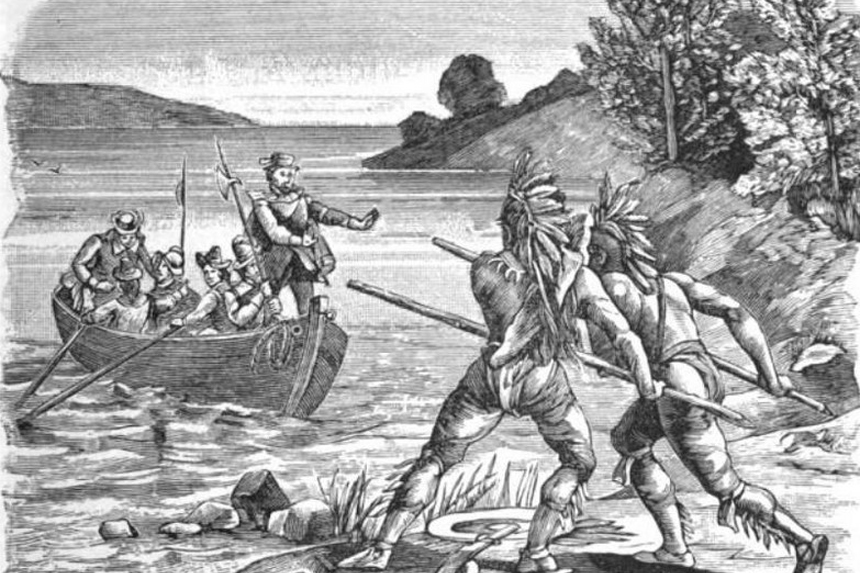Senior managing editor and logophile Andy Hollandbeck reveals the sometimes surprising roots of common English words and phrases. Remember: Etymology tells us where a word comes from, but not what it means today.
I recently had the opportunity to visit the American Writer’s Museum in Chicago. (Worth the price if you don’t also have to pay for parking.) A centerpiece of the museum is a display of 100 writers — in roughly chronological order — with information about their contributions to American literature.
One of the men featured was Captain John Smith, who holds a position of legend in the story of the founding and success of Jamestown, England’s first permanent settlement in the New World. Though we think of him as an explorer and colonizer, he also wrote quite a bit about his travels. The museum display quoted this from his book The Generall Historie of Virginia, New-England, and the Summer Isles, published in 1624:
We conceited them to be but as all Salvages ever had beene, kinde till they found opportunitie to do mischiefe. Wherefore we determined to take some of them, before they should suspect we had discovered their plot.
The “plot” here was an ambush of English traders by native warriors.
There is a lot to question about the accuracy of Smith’s Generall Historie. It claimed to cover New World history up to its publication date, but he returned to England in 1609 and, except for a short trip to what is now New England in 1614, mostly to hunt whales, he never returned to North America for any length of time. Furthermore, he had never visited the Summer Isles — aka the Somers Isles, aka Bermuda. Large swathes of the information contained in the book must have come to him secondhand, or were simply pieced together from his own mind.
Lastly, Smith wanted to use the book to raise money to finance a new American settlement, so he had a specific audience in mind when he wrote it: God-fearing rich white Englishmen. The book consequently plays up the heroism and struggle of the Jamestown settlers, the role of God in ensuring their success, and of course the “savagery” and ungodliness of the indigenous people in America. This book contains a description of being saved by a young Pocahontas at the moment of his execution that was a heightened version of a story he first told in 1616. Pocahontas, it should be noted, died seven years before this was published. (Some have argued that Smith’s whole experience was a Powhatan ceremony that he did not understand.)
Throughout Generall Historie, Smith refers to Native Americans not as savages, but as salvages. I had only ever known salvage in the sense of items recovered from a shipwreck or other calamity. Was this a misprint? Was Smith just a bad speller? Could it be that the words savage and salvage etymologically related?
The short answer to all three questions: no.
Modern-day salvage (“property saved from destruction”) traces back to the Latin salvus “safe,” as do save and salvation (but, unexpectedly, not the noun salve).
Savage, on the other hand, finds its roots in the Latin silva “forest or grove.” In the Late Latin period (ca. A.D. 200-500), the adjective silvaticus (literally “of the woods”) became salvaticus, which evolved into Old French as both sauvage and salvage, both meaning “savage, wild, pagan.”
Both forms found their way into English and existed side by side for some time, but savage was the more popular spelling.
Samuel Johnson in his 1768 Dictionary of the English Language includes both spellings with similar definitions, though he attributes its etymology to the Italian selvaggio. John Entick’s New Spelling Dictionary (1783) includes an entry for salvage, which is defined in part as “savage”; oddly, he uses “savage” in multiple definitions but doesn’t define savage itself.
A hint of the lives of these dual spellings is recorded in John Ash’s New and Complete Dictionary of the English Language in 1775. Salvage (meaning “savage”) appears with the note “a less-modern, but correct spelling.” Dictionaries are always playing catch-up with the language, using as their source material publications of the past. Ash, then, would have been digging into books not only from the 1700s but the 1600s (when Generall Historie was published) and even the 1500s.
The 16th and 17th centuries saw a number of calls for English spelling reform. One tack, supported by many in academia, was to retain a word’s etymological past in its spelling as much as possible, often by adding (sometimes unpronounced) letters to words to indicate the historical link. Sometimes those “etymological” spellings stuck; it’s why there’s a silent b in debt and a silent p in receipt. It’s likely that salvage continued to exist alongside savage for the same reason — at the insistence of academics who believed it the “proper” spelling — and that the l was silent.
The salvage spelling just wasn’t as widely adopted among English writers and speakers, and no doubt it could cause confusion with the other sense of salvage. It eventually fell into disuse, and savage became the norm.
Those etymology-minded academic spelling reformers didn’t always get their facts right, by the way. They’re the ones who added a silent s in the word island, where it didn’t belong. But that’s a topic for another day.
Become a Saturday Evening Post member and enjoy unlimited access. Subscribe now




Comments
Thanks, Andy. These are two words I never thought could/would have ever been even remotely related!